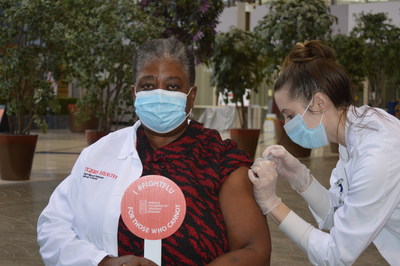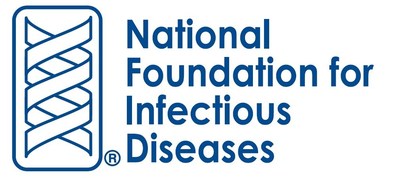New data released today by the National Foundation for Infectious Diseases (NFID) shows a significant gap in vaccine confidence among Black adults in the US. Despite bearing a disproportionate burden of serious disease and death related to COVID-19 and influenza (flu),
|
BETHESDA, Md., Feb. 4, 2021 /PRNewswire/ -- New data released today by the National Foundation for Infectious Diseases (NFID) shows a significant gap in vaccine confidence among Black adults in the US. Despite bearing a disproportionate burden of serious disease and death related to COVID-19 and influenza (flu), a large percentage of Black adults say they will not get a COVID-19 vaccine when eligible, and they are either unsure or will not get a flu vaccine this season. "In the midst of the pandemic, we need to continue to focus on increasing vaccination rates among those who are at higher risk of severe complications, including Black adults, many of whom have chronic health conditions that put them at greater risk," said Patricia N. Whitley-Williams, MD, NFID president and associate dean of inclusion and diversity at Rutgers Robert Wood Johnson Medical School. The NFID survey found that only 49 percent of Black adults plan to get vaccinated against COVID-19. Among that group, only 19 percent plan to get vaccinated as soon as possible, while approximately 31 percent prefer to wait. Thirty percent of Black adults do not plan to get a COVID-19 vaccine, with an additional 20 percent unsure of whether they would get vaccinated. Among those who are unsure or who do not plan to get vaccinated, the top reasons cited were concerns about the safety and efficacy of vaccines based on the speed of development, that the vaccines could hurt them, or that they could get COVID-19 from the vaccines. Less than a quarter of survey respondents said they were extremely or very confident in COVID-19 vaccine efficacy, safety, or adequate testing among US Black adults. Similarly, Black adults expressed a lack of confidence in COVID-19 vaccine distribution, with only 16 percent saying they were confident that the vaccines would be distributed equitably. When asked about flu, although a majority of US Black adults believe vaccination is the best protection against flu and have received or plan to get a flu vaccine, 35 percent of Black adults said they do not plan on getting a flu vaccine during the 2020-2021 flu season, while an additional 11 percent are unsure. Top reasons cited were concerns about potential side effects and the misconception about getting flu from the vaccine. The survey also found differences in vaccination attitudes by age and gender. Black adults age 60 years and older are most willing to be vaccinated against COVID-19 (68 percent plan to get vaccinated) compared with Black adults age 18-44 years (only 38 percent). Similarly, 81 percent of Black adults over age 60 years agree vaccination is the best way to prevent flu-related deaths and hospitalizations, compared with only 43 percent of Black adults age 18-44 years. Only 43 percent of Black women age 45-59 years are willing to get vaccinated against COVID-19, compared to 75 percent of Black men in the same age group. Only 59 percent of Black women over age 60 years are willing to get vaccinated against COVID-19 compared to 78 percent of Black men in the same age group. Younger respondents also expressed less trust in healthcare professionals and the US healthcare system. Fifty-seven percent of Black adults age 18-44 years said they trust healthcare professionals a great deal or good amount when it comes to information about flu vaccination, compared to 75 percent of Black adults age 45 years and older. Additionally, 60 percent of Black adults age 18-29 years said the US healthcare system always or often treats people unfairly based on race and ethnic background, compared to 40 percent of adults age 60 years and older. "The survey findings underscore the need to build trust in vaccines and the healthcare system among Black adults, including among younger age groups and women, who often make healthcare decisions for their families," said Dr. Whitley-Williams. "Medical professionals and the healthcare system at large must engage with Black communities, address their concerns, and convey the safety and importance of these vaccines in protecting against both COVID-19 and flu. We need to address common misconceptions identified in the survey and make it clear that there are currently safe, effective vaccines available in the US to help prevent COVID-19 and flu, and you simply cannot get COVID-19 or flu from the vaccines." For additional information on the survey, visit www.nfid.org. About the National Foundation for Infectious Diseases National Survey: Black Adult Perspectives on COVID-19 and Flu Vaccines Interviews for this survey were conducted between December 10-21, 2020, with Black adults age 18 years and older representing the 50 states and the District of Columbia. Panel members were randomly drawn from AmeriSpeak, and 1,340 completed the survey—1,165 via the web and 175 via telephone. Interviews were conducted in English. The final stage completion rate is 19.6 percent, the weighted household panel response rate is 21.0 percent, and the weighted household panel retention rate is 80.4 percent, for a cumulative response rate of 3.3 percent. The overall margin of sampling error is +/- 3.8 percentage points at the 95 percent confidence level, including the design effect. The margin of sampling error may be higher for subgroups. Once the sample has been selected and fielded, and all the study data have been collected and made final, a poststratification process is used to adjust for any survey nonresponse as well as any noncoverage or under and oversampling resulting from the study specific sample design. Poststratification variables included age, gender, census division, and education. Weighting variables were obtained from the 2020 Current Population Survey. The weighted data reflect the US population of Black adults age 18 years and older. Contact: Ned Berkowitz, 914-740-8255, Ned.Berkowitz@evokegroup.com
SOURCE National Foundation for Infectious Diseases |






